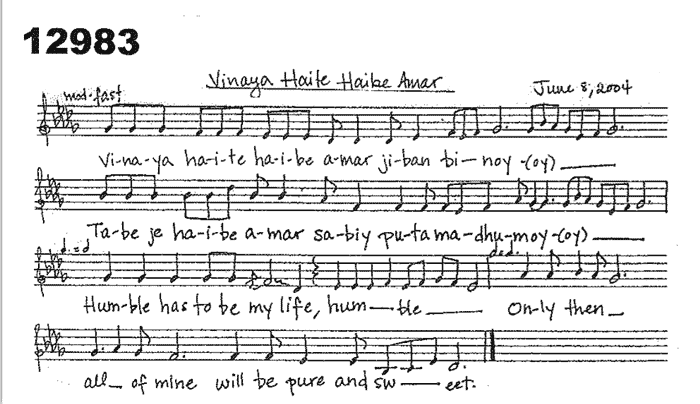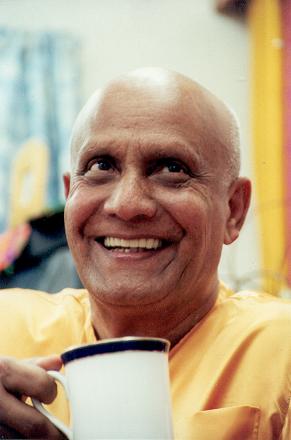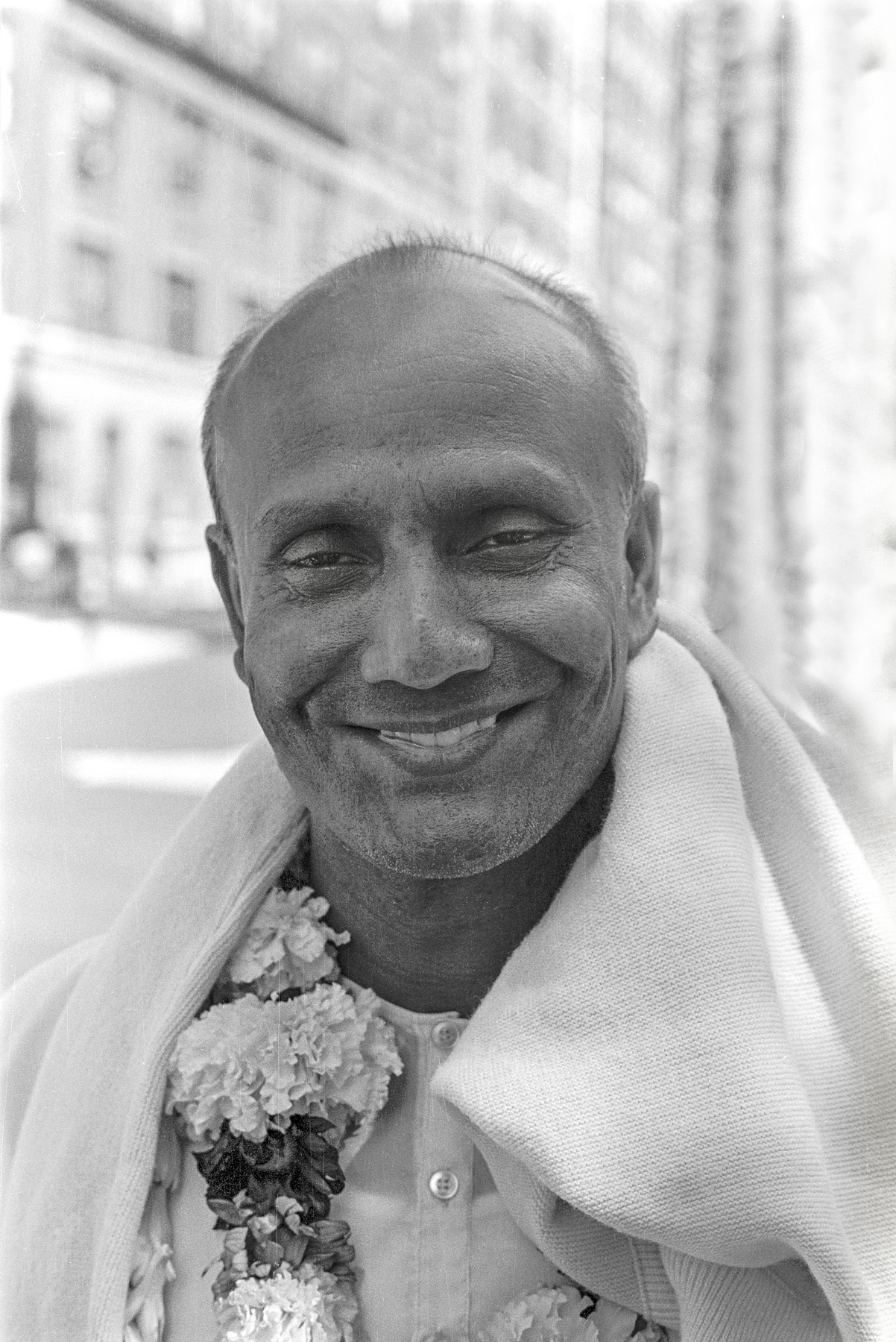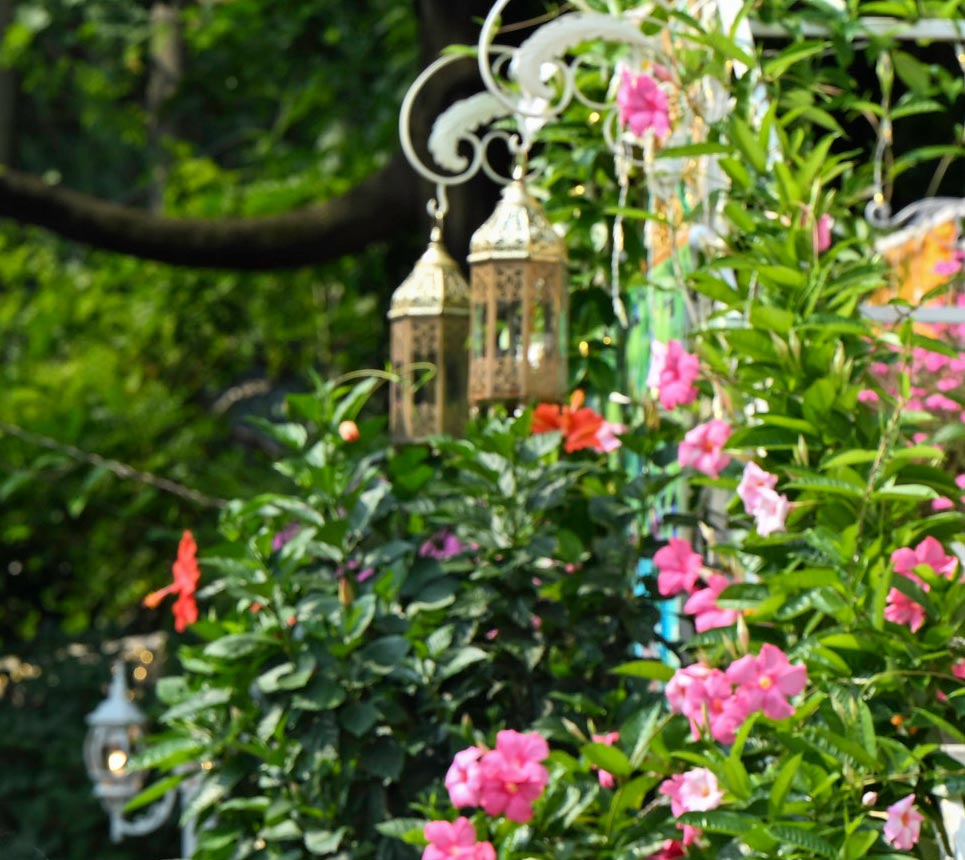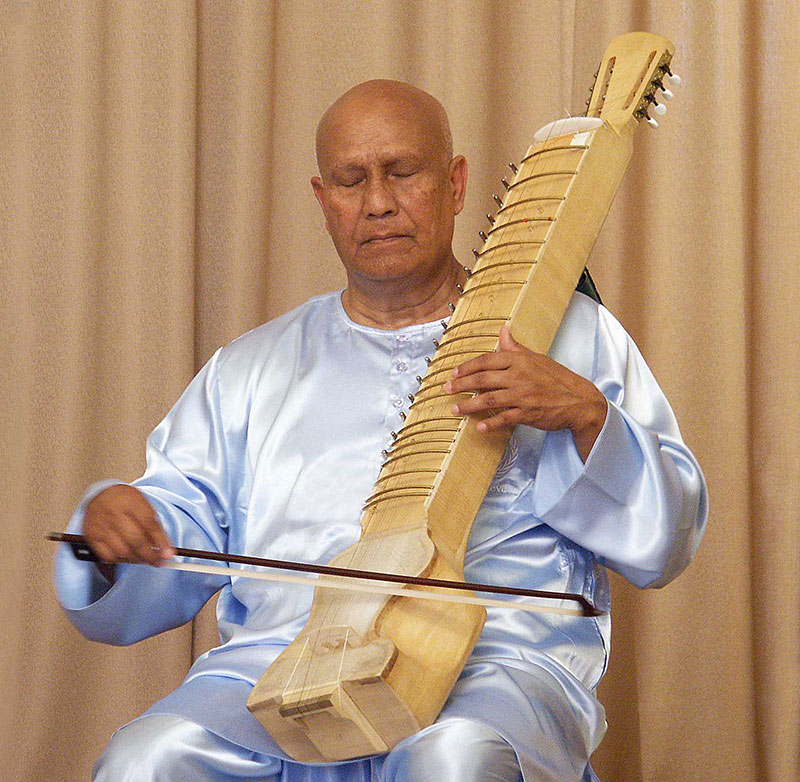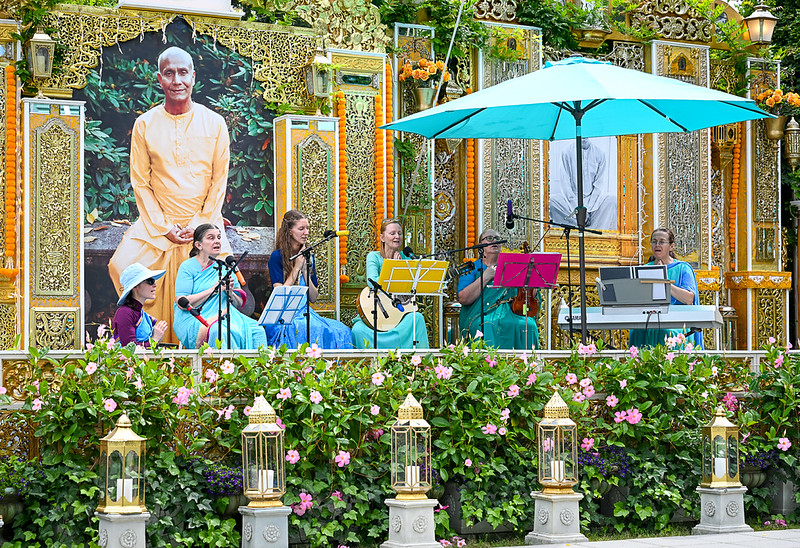Sri Chinmoy composed over 23,000 songs, and Kailash’s group is dedicated to learning and singing all of them. These recordings come from last years Christmas trip, where they sang 250 songs and passed the milestone of 13,000 songs.
Kailash’s group sing their 13,000th song
Last modified June 15, 2018
Sri Chinmoy composed his first song at the age of 14, and was composing songs right up until the day before his passing. For Sri Chinmoy, these songs came from a spontaneous connection to a deep inner source of peace, and expressed the many different inner experiences a spiritual seeker has on their way to the goal of enlightenment or God-realisation.
I feel that quality and quantity can go together. People often think that if you care for quantity, then you have to sacrifice quality. I feel this need not be true if there is inner guidance. If we can have a free access to our Inner Pilot, who inundates us with inspiration, then quality need not be sacrificed for the sake of quantity. If we know how to pray and meditate to gain a free access to the world of inspiration, if we have an inner communication with our Pilot Supreme, then quality and quantity can go together.
Sri Chinmoy
About the performances
Sri Chinmoy asked Kailash and a group of predominanly German singers to sing first 700 songs, and then 1000 songs in April 2000, and gave the group the name ‘Himalayan Summit Singing Group’. Since then the group has expanded to include Sri Chinmoy’s students from all over the world, and the goal has expanded to sing all of Sri Chinmoy;s songs, a goal with the group hopes to reach in time for Sri Chinmoy’s birth centenary in 2031.
Kailash’s group learns and sings 740 songs per year, performing them in three groups of approximately 250 each – in April and August when Sri Chinmoy’s students from all around the world visit New York, and during our year-end Christmas trip. On each occasion, they usually have eight singing performances which take place during our meditation functions, and they sing an average of around 30 songs per performance. Each song, no matter how long or short, is sung only once. Each performance is normally only a day apart; the group usually practise twice a day in between performances.
The eight sessions usually consist of 5 sessions of Bengali songs, and 3 sessions of mostly English songs. These particular songs (12821-13060, according to the the group’s own internal numbering system) were sung between 27 December 2017 and 3 January 2018, during our year-end Christmas Trip. The song scores below are among the songs that were sung during these performances.
Bengali songs
Performances 1-5
Sri Chinmoy grew up in Bengal, that was then part of India but is now divided between India and Bangladesh. The Bengali language in which the majority of his songs are written is the seventh most popular language in the world, spoken by over 200 million people. The language also has a rich spiritual tradition, having been the native tongue of such spiritual figures as Sri Chaitanya, Sri Ramakrishna and Swami Vivekananda.
There are two reasons why most of my songs are written in Bengali. One reason is that I am a Bengali and I know Bengali infinitely better than I know English. But if I am in a divine mood, I will call this a silly reason….The Bengali language outwardly is sweeter, much sweeter, than the English language. It has to its credit an inner reality, let us say a divine reality, a very subtle, haunting reality which the English language, unfortunately, lacks. The English language has many, many good qualities, but the immediate inner approach to the soul, to the inner reality, the sweetness and the heart quality of oneness you don’t get in English as immediately or as powerfully as you get it in Bengali. This is my yogic reason.
Most of these songs are short 2 and 4 line songs, ideal for mantric repetition and allowing the singer to attain increasing closeness with God. There are also quite a few longer songs. The Bengali songs cover a vast range of spiritual emotions, such as the bliss of enlightenment or the feeling of devotion that comes with a sense of closeness to God.

Translation: ‘Beyond joy and sorrow I shall now go; after centuries of longing for You, I shall receive you’ (Unofficial translation by Sri Chinmoy’s students)
Some of them are very dynamic, to inspire the seeker to go forward as quickly as possible on the way to the goal
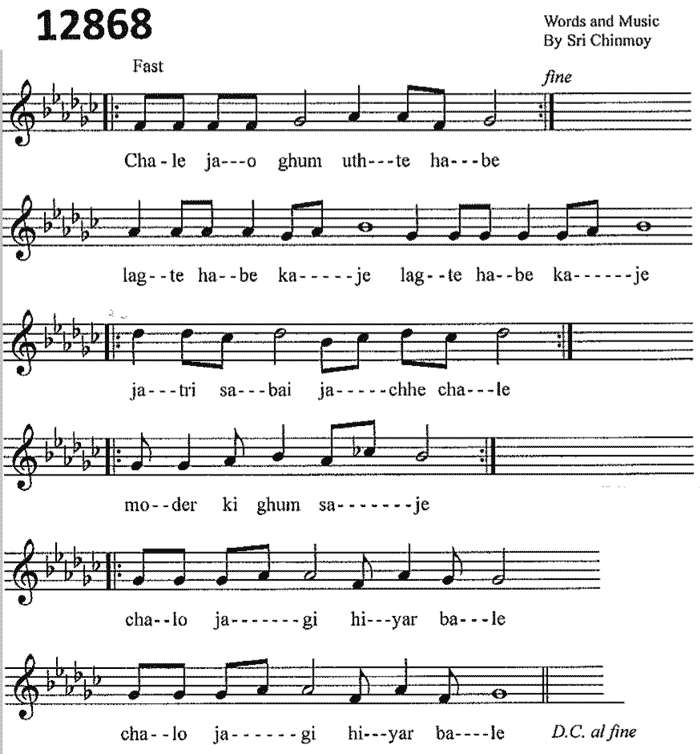
Sleep, away you go! Leave me aside. I must wake up. I must throw myself heart and soul into the vortex of life’s activities. O sleep, You and I together let us try to march Along with the pilgrims who are Bound for Eternity’s Golden Shore (poem-translation by Sri Chinmoy)
Some of songs identify with the struggles of the seeker, aiming to go beyond the limited mind:
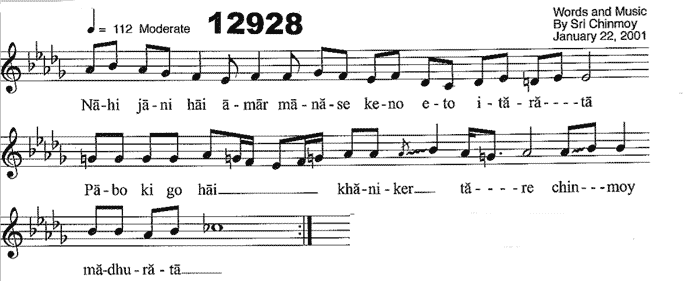
Translation: ‘Alas, I do not know why inside my mind there is so much meanness and baseness; Alas, how will I recieve, even for a fleeting second, the divine sweet consciousness?’ (Unofficial translation by Sri Chinmoy’s students)
None of the singers are native Bengali singers; Sri Chinmoy’s songs are generally transcribed into romanised phonetics for his students (and anyone else who is interested) to learn. Some of the members also work very hard to obtain translations for the songs.
English songs
Performances 6 and 7
Many of Sri Chinmoy’s English songs originally began as poems or aphorisms that were then set to music. Sri Chinmoy has also been writing poetry since his teens, and has hundreds of thousands of English poems to his credit, including 3 major epic series – Ten Thousand Flower-Flames (written between 1979-1983), Twenty Seven Thousand Aspiration-Plants (1983-1998), and Seventy Seven Thousand Service-Trees (50,000 completed by the time of Sri Chinmoy’s passing in 2007).
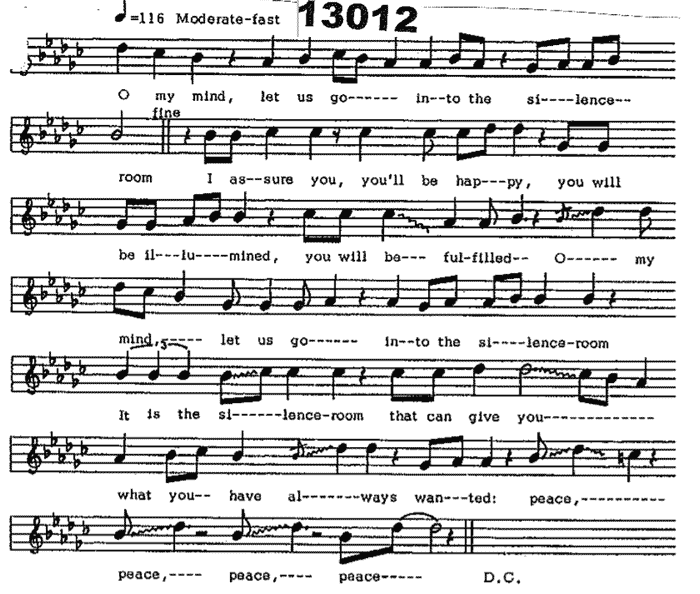
This poem originally appeared in Transcendence-Perfection, a set of 843 poems written by Sri Chinmoy in a 24 hour period in 1975
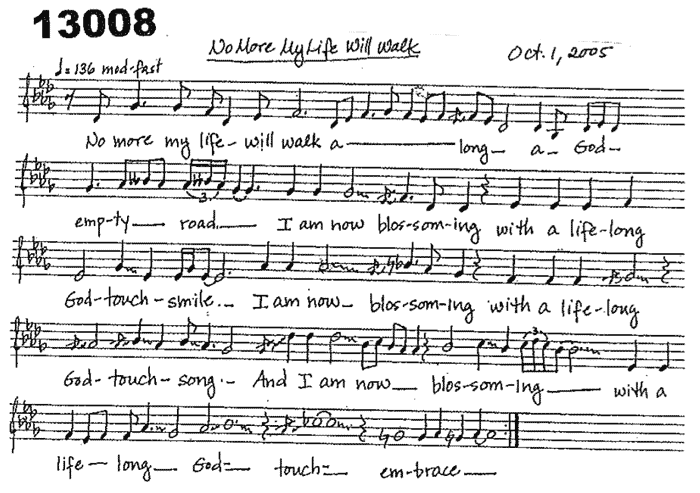
This poem was one of a series of poems that Sri Chinmoy composed every Saturday morning after the weekly 2 mile race in New York. These poems were published in a 3-volume series called My Race-Prayers. In this case, Sri Chinmoy composed the song and poem on the same day.
Some songs contain both Bengali and its English translation; these can be heard at the beginning of session 6.
Sri Chinmoy also set music to hundreds of ancient Sanskrit mantras, and wrote over 30 songs in French and 15 or so in the Chittagong dialect of Bengali that he grew up speaking. The end of performance 7 contained 3 ancient Sanskrit mantras set to music by Sri Chinmoy.
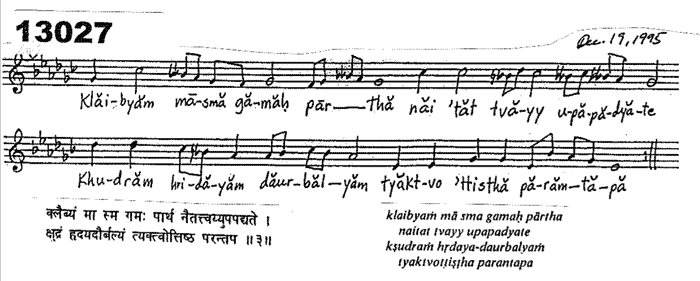
A Sanskrit extract (sloka) from the Bhagavad Gita, India’s sacred text, where Lord Krishna tells Arjuna, his beloved disciple, to arise and fight in life’s battlefield.
Note: The first 3 songs of performance 6 were not recorded, and performance 7, which took place on the morning of 2 January, was not recorded at all.
English ‘appreciation’ songs
Session 8
A large part of Sri Chinmoy’s English songs are songs appreciating the inner qualities of people that he met, and places that he visited
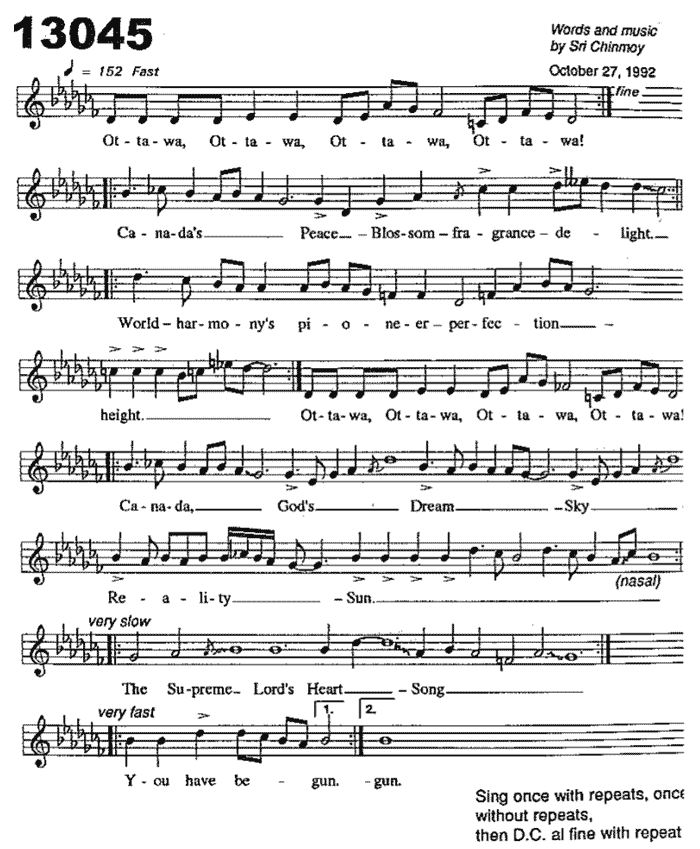
Song dedicated to the city of Ottawa. Ottawa was where Sri Chinmoy began his painting journey in 1974.
Question: Why have you travelled to so many countries and appreciated so many countries and individuals?
Sri Chinmoy: Some spiritual Masters are accepted in this country or that country because their divinity is infinitely more manifested in certain places. But in my case, I have gone to many places. I have travelled from country to country, holding Peace Concerts, meditating and writing songs about the souls of the countries. You ask why? For me, the soul of each country is real; the heart of each country is real. I see the divinity that is trying to be manifested in and through each country, in and through each individual, and in my songs I appreciate it and try to bring it forward.
If you have a heart of appreciation, then everything is beautiful; you see each petal of each flower as absolutely unique and beautiful. My little finger is not as strong as my index finger, but to me it is very cute. And the thumb is so strong! So each finger I look at I am appreciating. You may say it is a waste of time to travel so much. But if I can go from country to country appreciating this person who has inspired mankind or inspiring that person who has done something great, then I feel that I am really doing something worthwhile. It is inspiration that is holding up the entire universe. God Himself was inspired, and that is why He created this universe.
Sri Chinmoy
from Sri Chinmoy answers, part 10
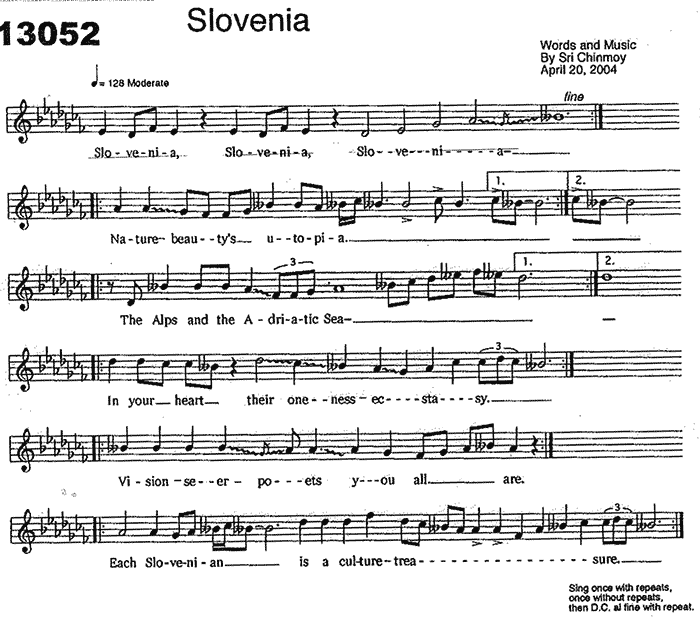
A song dedicated to Slovenia. Sri Chinmoy travelled there in 2004 as part of celebrations to mark the country’s entry into the European Union
When we appreciate the good qualities
In the height and depth of a country,
Its soul gets the inner strength
To awaken again
The members of its own family:
Its countrymen.Sri Chinmoy
In addition, he would often honour people by setting their quotations to music.

“Even in my dreams, I always think of myself as a monk and not the Dalai Lama” – the Dalai Lama
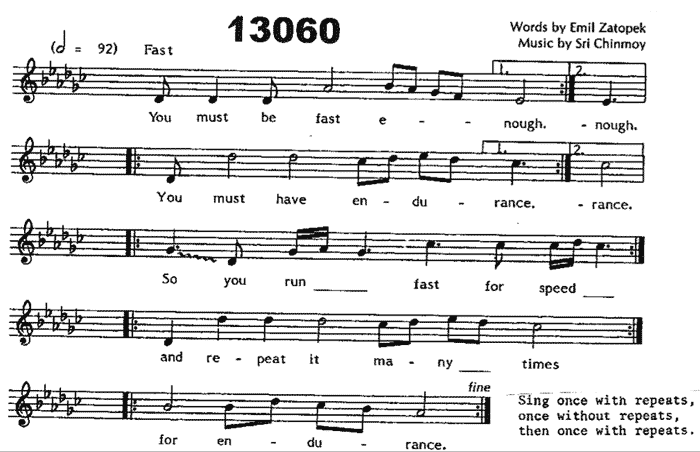
Quotation by Emil Zatopek, the Czech running great
Learning the songs
A great deal of work takes place before the group even learns the songs; the musical scores need to be put together, translations for the Bengali songs are sourced, and the songs are recorded so that members can learn by ear if they so choose. Members of the group spend up to 2 hours a day learning the songs.
Related
- You can look at the scores for this performance (complete with translations) here
- Audio interviews with group members: Kailash Beyer • Adarsha Kelly • Prachar Stegemann

